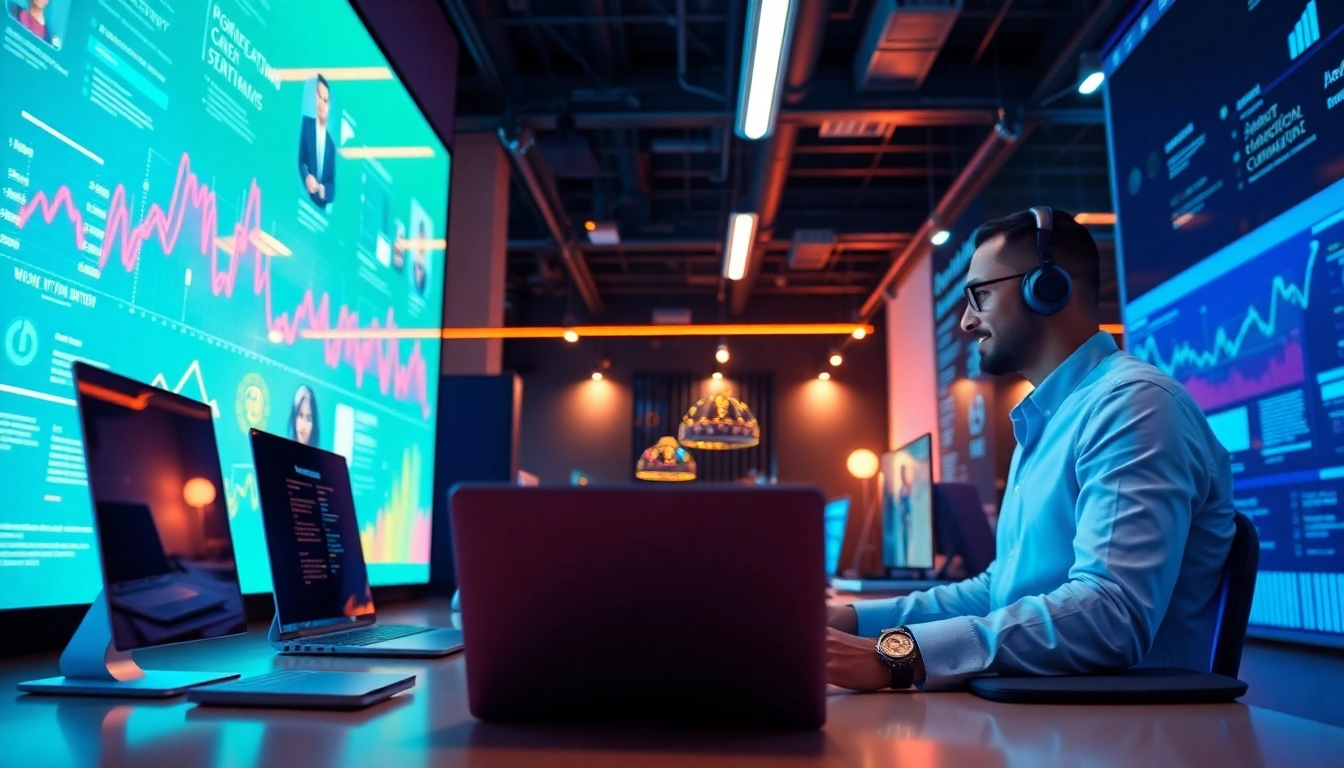Understanding AI Marketing Agents
In the dynamic landscape of digital marketing, the advent of AI marketing agents is transforming how businesses approach their marketing strategies. These cutting-edge tools are reshaping the way campaigns are executed and optimized, offering significant advancements over traditional marketing methods. As businesses strive for greater efficiency and better results, understanding AI marketing agents becomes essential.
What are AI Marketing Agents?
AI marketing agents are sophisticated software tools powered by artificial intelligence (AI) that automate and enhance various marketing tasks. They function as digital assistants that can analyze vast datasets, recognize patterns, and execute actions based on learned insights. These agents can operate with a degree of autonomy, but they typically require human oversight to ensure alignment with business objectives. Some common tasks performed by AI marketing agents include:
- Customer segmentation
- Predictive analytics
- Content personalisation
- Campaign optimization
By employing machine learning algorithms and data analytics, AI marketing agents are able to provide personalised experiences to customers at scale, driving engagement and conversion rates.
Key Functions and Benefits
The functionality of AI marketing agents stretches across various dimensions of marketing, facilitating better decision-making and automating cumbersome processes. Here are some key functions and the associated benefits:
1. Automation of Routine Tasks
One of the most significant advantages of AI marketing agents is their ability to automate repetitive and time-consuming tasks. By freeing marketing personnel from mundane operations, they can focus on more strategic activities, such as creative planning and campaign development.
2. Enhanced Personalization
AI marketing agents analyse customer behaviour and preferences, which allows businesses to deliver tailored marketing messages. Personalized experiences can significantly enhance customer loyalty and increase sales conversion rates.
3. Data-Driven Insights
With the ability to process and analyze large volumes of data, AI marketing agents provide insights that are more accurate and timely. Businesses can leverage these insights to make informed decisions that boost overall marketing efficacy.
4. Improved Customer Targeting
AI-powered tools can identify and target specific market segments with high precision. By understanding customer demographics, behaviours, and preferences, marketers can create more effective campaigns that resonate with their audience.
How AI Marketing Agents Differ from Traditional Marketing Methods
Traditional marketing relies heavily on manual processes, which can limit the speed and effectiveness of marketing efforts. By contrast, AI marketing agents bring a level of sophistication that traditional methods lack:
1. Speed
AI marketing agents can perform analyses and execute campaigns at speeds far beyond human capabilities, allowing for quicker adjustments and adaptations in marketing strategies.
2. Scalability
AI marketing tools can be scaled rapidly to meet the needs of growing businesses, handling increased workload without the necessity for hiring additional staff.
3. Cost Efficiency
By automating tasks and providing data-driven insights, AI marketing agents can reduce costs associated with marketing campaigns while improving their effectiveness.
Integrating AI Marketing Agents in Your Strategy
Implementing AI marketing agents requires a strategic approach to ensure that they align with business goals and enhance marketing efforts. Here are some crucial steps:
Steps to Implement AI Agents in Marketing
1. Define Clear Objectives: Before integrating AI, identify specific marketing goals, such as increasing lead generation or improving customer engagement.
2. Choose the Right Tools: Research and select AI tools that align with your goals. Options range from automation software to predictive analytics platforms.
3. Train Your Team: Equip your marketing team with the necessary training to maximize the potential of AI technologies. Understanding how to interpret data insights is vital.
4. Monitor and Adjust: Regularly evaluate the performance of AI marketing agents and adjust strategies as needed based on data analytics.
Common Challenges and Solutions
While AI marketing agents bring numerous benefits, challenges may arise during implementation:
1. Resistance to Change
Some team members may resist adopting new technologies. To overcome this, communicate the benefits of AI tools clearly and involve team members in the integration process.
2. Data Privacy Concerns
AI marketing agents often require data collection, raising privacy issues. Ensure compliance with data regulations and maintain transparency with customers about data usage.
3. Misalignment with Business Goals
Without clear objectives, AI strategies can falter. Regularly align AI initiatives with overarching business goals and refresh them as necessary.
Real-World Examples of Success
Many companies have successfully integrated AI marketing agents into their strategies:
1. Netflix: The streaming giant uses AI algorithms to analyze viewing habits and recommend personalized content to users, enhancing the customer experience and increasing viewer retention.
2. Coca-Cola: By leveraging AI in marketing campaigns, Coca-Cola executes targeted advertising based on consumer behaviour analysis, driving sales and brand loyalty.
Top AI Marketing Agents Available Today
A plethora of AI marketing tools exist in the market, each offering unique features tailored to various marketing needs:
A Comprehensive List of AI Tools
1. HubSpot: This platform integrates AI in email marketing, content management, and lead tracking to streamline marketing processes.
2. Marketo: Marketo utilizes AI to help businesses automate marketing campaigns and manage customer relationships effectively.
Comparative Analysis: Best Performers
While choosing the right tool, consider the performance comparison based on the following criteria:
- Usability
- Customization Options
- Analytics and Reporting Features
- Integration Capabilities with other tools
Future Trends in AI Marketing Tools
The future holds promising developments for AI marketing agents:
1. Increased Personalization
Expect further advancements in personalized marketing strategies driven by AI, allowing brands to create even more tailored customer experiences.
2. Enhanced Predictive Analytics
AI tools will become more adept at predicting consumer behaviour based on data trends, helping marketers anticipate needs and enhance decision-making.
Measuring the Impact of AI Marketing Agents
As businesses invest in AI marketing agents, measuring their impact becomes crucial to assess effectiveness:
Key Performance Indicators to Monitor
To gauge the success of AI marketing initiatives, focus on these KPIs:
- Conversion Rates
- Customer Engagement Levels
- Customer Acquisition Cost (CAC)
- Return on Investment (ROI)
Evaluating ROI on AI Marketing Investments
Proper calculations of ROI on AI marketing investments involve a systematic approach:
- Determine the total investment in AI tools and resources.
- Measure the increase in revenue attributable to AI-driven efforts.
- Calculate the ROI using the formula: (Net Profit / Cost of Investment) x 100.
Insights from Case Studies
In-depth case studies provide valuable insights into effective AI marketing deployments:
For example, a B2B company implemented AI-driven lead scoring, significantly increasing conversions by effectively prioritizing leads based on predictive analytics.
Future of AI Marketing Agents
As artificial intelligence continues to evolve, its impact on marketing strategies will expand:
Predictions for AI Development in Marketing
Experts predict that AI will increasingly enable hyper-personalization, where marketing messages are customized in real time based on consumer interactions.
The Role of Human Marketers in an AI-Driven Landscape
While AI marketing agents enhance efficiency, the role of human marketers remains vital. Marketers will need to leverage their creativity, empathy, and strategic thinking to complement AI capabilities.
Preparing Your Business for the AI Revolution
As businesses prepare for the AI revolution:
- Invest in training and upskilling staff to work alongside AI tools.
- Stay updated on emerging AI technologies and trends to maintain a competitive edge.
- Foster a culture of innovation that embraces AI as a strategic asset rather than a replacement.
By embracing AI marketing agents and integrating them into marketing strategies, businesses can navigate the complexities of the digital landscape, achieving unprecedented growth and customer satisfaction.




